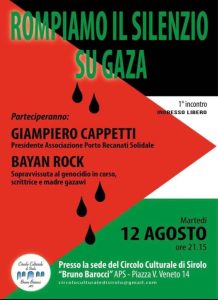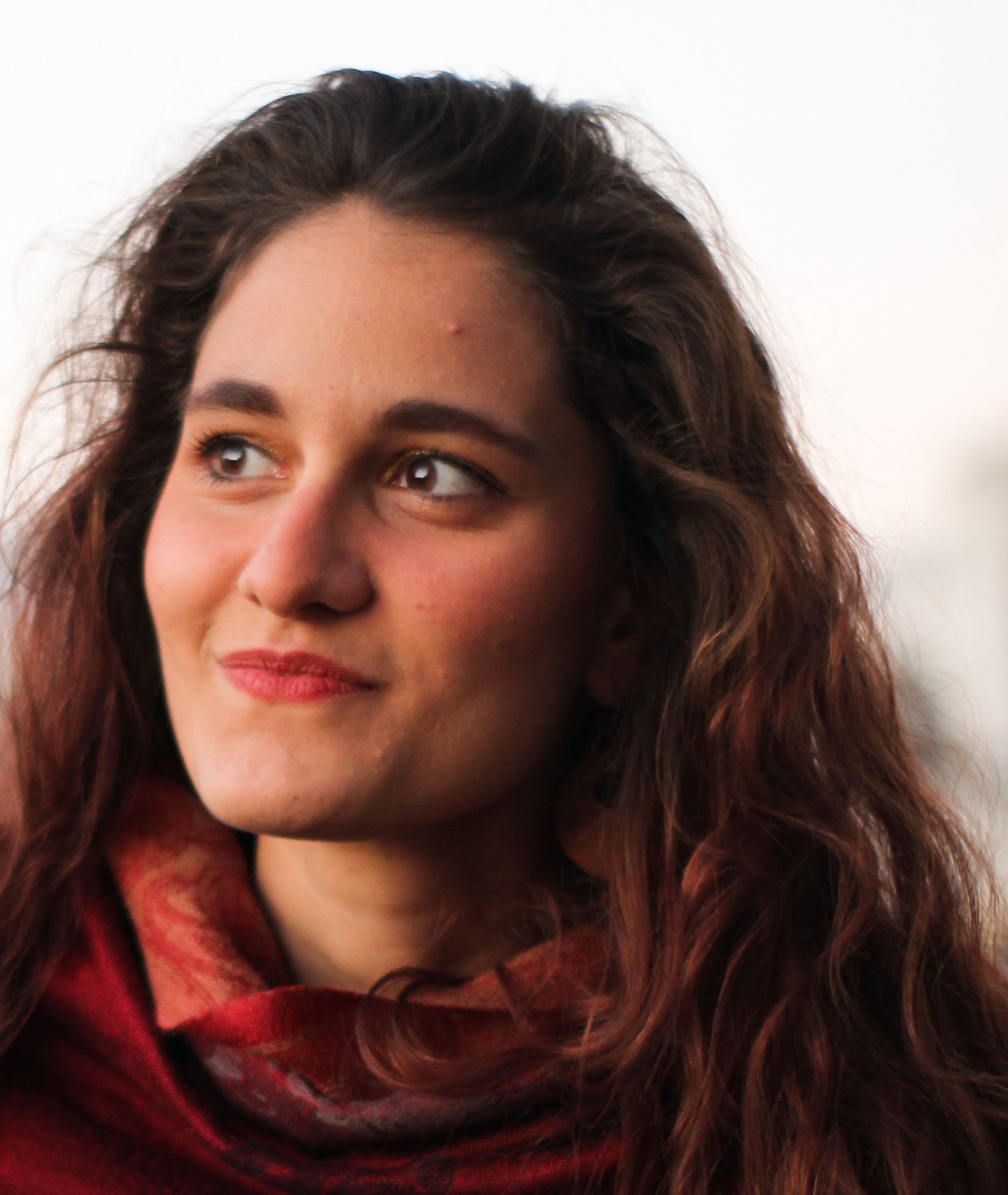
On Tuesday, 12th of August, an impactful evening with the title “Let’s break the silence on Gaza” took place in Sirolo, a small town in the province of Ancona. The event, organized by grassroots volunteers, was a call to action. The message was clear: our response cannot be silence. Helping is not only about donations but about showing up, speaking out, and refusing to look away through small, daily acts.
Framed by the beauty of Mount Conero, local associations such as Porto Recanati Solidale, Sumud, and the Coordinamento Marche per la Palestina organized a public talk with two young sisters from Gaza, Bayan and Iman. The aim was simple but urgent: to share their stories and, hopefully, to break the silence on Gaza. The invitation was open to the whole community — and the response was overwhelming. The room filled up quickly, and organizers had to set up a megaphone outside so that everyone could listen. Dozens stood under the summer sky, waiting to hear voices that too often remain unheard.
Bayan and Iman have been in Porto Recanati for just two months. Yet their hearts remain in Gaza, where most of their families are still trying to survive.
The gathering was informal, but the purpose was deep: shedding light on lives shattered both physically and metaphorically. Bayan, 30, recalled her home in Gaza with a mixture of pride and grief: the family gatherings, her bedroom, her memories. All of it, she said, has been erased.Giampiero, one of the coordinators, spoke about his long friendship with Bayan and about the story of Porto Recanati Solidale. What began more than a decade ago as a small group of friends supporting Syrian refugees at the Turkish border grew into a grassroots association driven entirely by volunteers. Armed with patience and determination, they spent their holidays traveling to deliver food, toys, and supplies. Those experiences, Giampiero admitted, changed his life: “I realized that it’s often ordinary citizens, not governments, who push humanity forward.”
Over time, the association expanded its work, reaching the coasts of Greece. When Covid-19 hit, they didn’t stop. Instead, they turned their focus homeward, supporting families in the Marche region who were struggling with food insecurity and isolation. Since October 7th, their attention has been on Gaza: raising awareness, advocating for families, and amplifying the voices of those trapped in destruction.
That’s why, on the 12th of August, we gathered with Bayan and Iman — to touch, through their voices, the reality of war. When someone in the audience asked Bayan what life had been like before, she smiled softly: “I had the best life — our house, laughter, freedom.” She explained that she has always written, that she studied at university to become a writer.
Even before coming to Italy, Bayan exchanged long messages with Giampiero whenever the internet allowed. Those conversations gave her a chance to escape, at least for a moment, from despair. They became her evening ritual, a space where she could just be Bayan: a young woman with dreams, words, and poems to share.
One of those poems, إِلى متى Until When, she read aloud that night:
(…)
“until when will sadness keep invading homes,
and the sky remain a haze of smoke?
Is our country well?
Are our dreams still alive?
Or has conscience died within every human being?
You see the scenes upon the screens,
yet shut your eyes to the cries of bewildered agony?”
Bayan dreams of publishing her work one day. “I want to be the voice of Gaza,” she told me when we spoke after the event. “That’s my biggest hope: to speak for her, to give her a voice from inside. This is what gives me strength.”
Call to action
Giampiero closed with words that still resonate: “I don’t want to think ‘what if this happens to us tomorrow.’ That’s selfish. We must care about today, about what is happening now — to them. The rest is noise.”
The evening ended with a call to action from the heads of Sumud and the Comitato Marche per la Palestina: what was shared that night cannot remain inside four walls. If the genocide in Palestine doesn’t move us, then our very humanity is at risk. Helping isn’t only about donations — though those are vital — it’s also about showing up, joining cultural events, talking about uncomfortable truths, and refusing silence. It’s about small, daily acts that, through their persistence, break the silence on Gaza everywhere: in workplaces, at school, in our moments of leisure, to remind us of the responsibility that comes with our privilege of being safe.
Because we don’t act because it’s useful. We act because it’s right.
The path of solidarity is not walked alone. Reach out to local associations and events; they exist as beacons of collective action, reminding us that hope becomes concrete when we come together.
